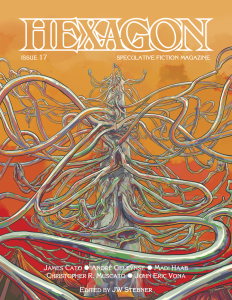Fusion Fragment, Diabolical Plots, and GigaNotoSaurus: Short Fiction Reviews by Charles Payseur
 Hexagon 6/24
Hexagon 6/24
Fusion Fragment 6/24
Diabolical Plots 6/24
GigaNotoSaurus 6/24
The latest issue of Hexagon is devoted to stories focused on climate change and climate resilience – people coming together to push back against the forces that have led to ecological and societal disaster and trying to walk humanity back from the brink of ruin. As in Madi Haab’s “Heat Devils”, which features brisk action as two women – the narrator Shan and her partner Nayeli – break into a storage facility of a dominant tech company to steal something. Haab builds a world where people are indentured to companies and have their lives and bodies controlled, and Shan and Nayeli are part of a growing movement to fight and take back power, by recovering the biological tools in the form of seeds that have been all but eradicated in favor of proprietary GMOs. It’s a thrilling heist with plenty of spills and chills, and still an emotional and character-driven core that pays off well. James Cato takes a different approach with the terrifying “Wonders of a Plastic Ocean”, which finds a government agent sent to find a few high priority targets along a beach where multiple groups of climate refugees have gathered. Each group has built a giant effigy out of plastic, and the agent finds himself struck by strange dreams and a stranger reality where the enormous effigies move at night, as if alive. Cato dives into some heady waters, imagining the Earth itself striving for balance by creating new predators to handle a human population completely out of control. The piece deals closely with loyalties and peoples, the kinds of violence that exist in the world, and the nature of predators. It’s at times rather uncomfortable, but also well worth spending some time with.
The June Fusion Fragment features Uchechukwu Nwaka’s “An Offering of Algae”, which finds the remnants of humanity living off the meat supposedly raised by a god. A select few get to venture to the heaven where this last god lives in order to collect the food and return, saving people from the wasting disease that visits those who try and go without. Nzeh’s father was one of the priests honored with retrieving the meat, but upon his return he was… changed. It opens a mystery that Nzeh is determined to solve, even if it shakes everything he knows to the ground. Nwaka plays with survival and revulsion, belief and betrayal, and manages an ending that is strange, unsettling, and skillfully done. Meanwhile, Lore Lopez takes readers on an underwater adventure of sorts in “Entrevista”. Lopez uses a nested narrative to tell the story of a found text suspected to be false, and yet as the narrator digs into a series of strange recordings, reality blurs a bit surrounding an underwater expedition to investigate something that seems to erase people from existence. And as the narrator discovers more, readers are left to decide for themselves about the authenticity of the recordings, which provides some delicious layering as the fiction of the story, the non-fiction conceit of the narrator, and the possible fiction of the recordings all build into something memorable and enjoyable. Definitely one to check out!
June’s Diabolical Plots features Lauren Ring’s chilling story “This Week in Clinical Dance: Urgent Care at the Hastings Center”. In it, a dancer seeks to be treated and yet cannot seem to win the attention of the doctors who would treat her, who don’t quite buy into all of the symptoms her dance portrays, at least not without the “appropriate” bloodwork results. She is left trying desperately to perform an illness that is hurting her, that might be killing her, in the hopes that she can win treatment – a prospect that seems continually out of reach. Ring excoriates the medical system by revealing the ways that healthcare professionals often seem like the greatest and most terrible of critics and gatekeepers, withholding vital care based at times on no more than personal whims and a lack of understanding and empathy. It’s a sharp and fantastic read.
GigaNotoSaurus opens June with Diana Dima’s “Underdragon”, which finds Margaret and Gabrielle on holiday for the first time in a long time, and it’s not exactly going well. At least not until Gabrielle gets a little lost and ends up in a shop where she buys what she thinks is makeup remover but which turns out to be a lot more. She begins to transform, and along with the physical changes she also begins to see a wider beauty – her own, and that of the world around her and its many people. It allows her to paint again, and though the transformation has some big impacts on her life and relationships, Dima frames the changes as part of a self-discovery that is magical and wondrous. The story explores the power of art, the nature of beauty, and it’s a tender look at personal change.
Recommended Stories
“Wonders of a Plastic Ocean”, James Cato (Hexagon 6/24)
“Entrevista”, Lore Lopez (Fusion Fragment 6/24)
“This Week in Clinical Dance: Urgent Care at Hastings Center”, Lauren Ring (Diabolical Plots 6/24)
“Underdragon”, Diana Dima (GigaNotoSaurus 6/24)
Charles Payseur is an avid reader, writer, and reviewer of speculative fiction. His works have appeared in The Best American Science Fiction and Fantasy, Lightspeed Magazine, and Beneath Ceaseless Skies, among others, and many are included in his debut collection, The Burning Day and Other Strange Stories (Lethe Press 2021). He is the series editor of We’re Here: The Best Queer Speculative Fiction (Neon Hemlock Press) and a multiple-time Hugo and Ignyte Award finalist for his work at Quick Sip Reviews. When not drunkenly discussing Goosebumps, X-Men comic books, and his cats on his Patreon (/quicksipreviews) and Twitter (@ClowderofTwo), he can probably found raising a beer with his husband, Matt, in their home in Eau Claire, Wisconsin.
This review and more like it in the August 2024 issue of Locus.
 While you are here, please take a moment to support Locus with a one-time or recurring donation. We rely on reader donations to keep the magazine and site going, and would like to keep the site paywall free, but WE NEED YOUR FINANCIAL SUPPORT to continue quality coverage of the science fiction and fantasy field.
While you are here, please take a moment to support Locus with a one-time or recurring donation. We rely on reader donations to keep the magazine and site going, and would like to keep the site paywall free, but WE NEED YOUR FINANCIAL SUPPORT to continue quality coverage of the science fiction and fantasy field.
©Locus Magazine. Copyrighted material may not be republished without permission of LSFF.





